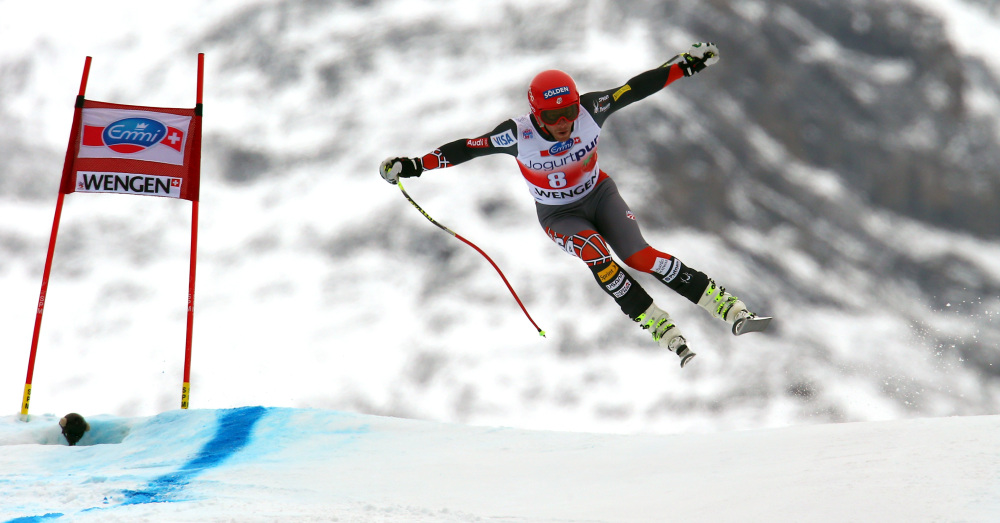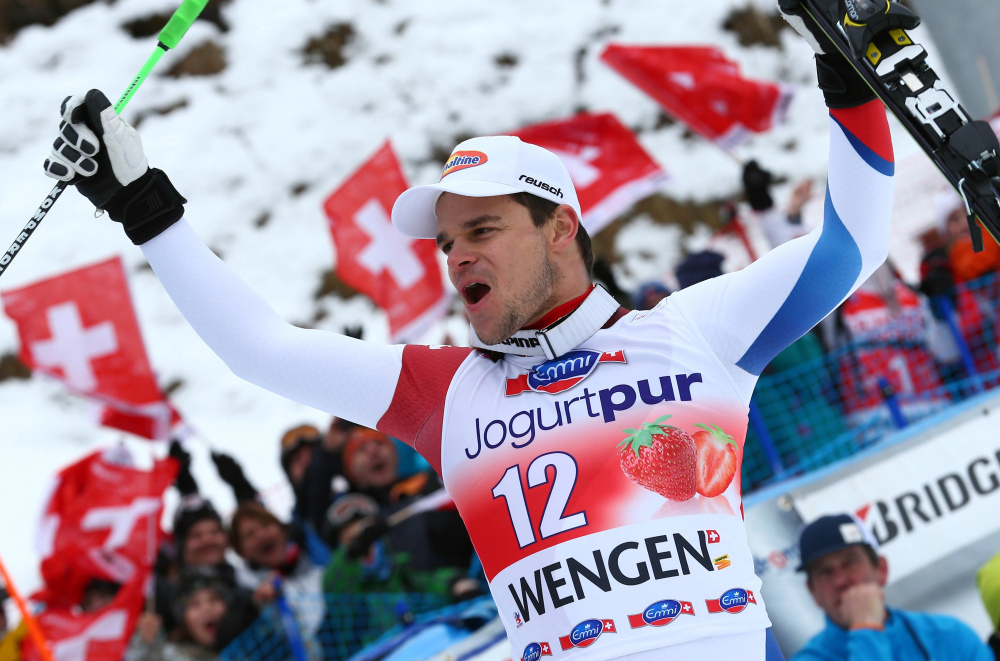WENGEN, Switzerland — Switzerland is very happy to have Patrick Kueng in this Winter Olympics season.
Kueng won the classic Lauberhorn downhill race over a shortened course on Saturday, giving the Alpine nation and most of the 29,000 fans lining the slope a fourth home victory within six years in their biggest sports event.
In a tight race, Kueng’s winning time of 1 minute, 32.66 seconds was 0.06 faster than Hannes Reichelt of Austria. Overall World Cup leader Aksel Lund Svindal of Norway was one more hundredth further back and two-time Lauberhorn winner Bode Miller was fifth.
Kueng’s second World Cup win this season, after a super-G at Beaver Creek, Colorado, last month, confirmed his status as Switzerland’s best men’s hope for Olympic success in Sochi.
He is shining as more heralded teammates – Olympic champions Didier Defago and Carlo Janka, plus Beat Feuz – still hope to rebound from the squad’s historically poor 2013 season.
“After my win in super-G I felt like I should be the team leader,” Kueng said through a translator. “I’m OK with the pressure. I’m 30 so I know how to take it.”
Kueng is making a strong case with four top-5 finishes in the World Cup this season, against none for the trio of former Lauberhorn winners. Defago and Feuz were tied for 10th and Janka was heading for a similar finish until his left ski popped off in the bumpy final S-turn.
There is also unfinished Olympics business for Kueng, who traveled to the 2010 Vancouver Games but was edged out of the Swiss downhill team when Defago excelled in the final training session. Defago then justified the coaches’ faith by racing to the gold medal just hundredths ahead of Svindal and Miller.
“Yes, it was a tough time. I know that the Olympics are very special,” said Kueng, who tore the ACL in his left knee in February 2012 when crashing across the finish line in a home super-G at Crans-Montana.
A delayed start to last season excused him some blame for the team’s terrible showing as, without the injured Feuz, it earned just a single third-place finish.
“Having started my training in October (2012), my results weren’t that bad,” said Kueng, now enjoying a breakout season.
“Hats off to Kueng, he’s been skiing amazing this season. It’s really not a surprise to the racers,” said Marco Sullivan of the United States, who finished 16th after an aggressive run, 0.99 behind Kueng.
Wind gusts of 50 mph higher up the mountain meant the start was lowered below the famous Hundschopf cliff face jump. With top sections favoring pure downhill racers, the course became more suited to technical, super-G specialists and fatigue was less of a factor at the bottom.
Still, Reichelt said he lost crucial time in the twisting final section, though praised Kueng as a worthy winner.
“He was very consistent this season. It was just time until he got the victory,” said Reichelt, adding wryly that he was “getting closer” after placing third last year.
Starting four racers after No. 12 Kueng, Svindal said the crowd roars told him who was leading.
“You didn’t need a radio at the start to hear that the Swiss were doing good,” said the Norwegian, whose career-best Lauberhorn finish padded his leads in the overall and downhill standings.
Two-time defending champion Marcel Hirscher of Austria can regain the overall lead by winning the slalom on Sunday.
Miller continues to show good form in downhill, finishing 0.35 back after a tailwind died at the start and making a mistake in the same spot that troubled Reichelt.
“I waited in the start for as long as I could hoping a wind would come up because it was there for a few guys,” he told broadcaster NBC Universal.
Send questions/comments to the editors.



